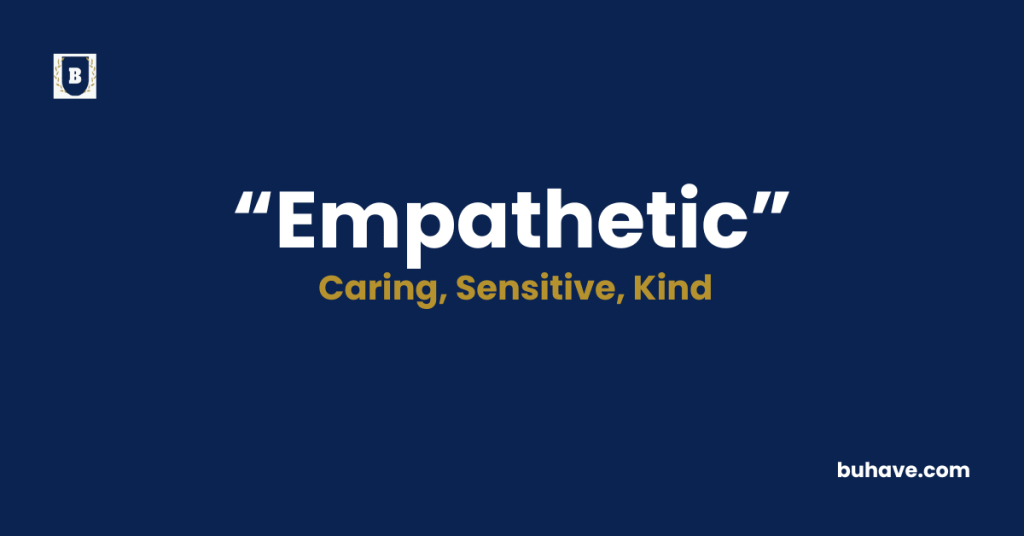The word ‘Empathetic’ (Adjective) describes a person who can deeply understand and share the feelings of others. First of all, an empathetic person doesn’t just recognize another person’s emotions they genuinely feel them. in this guide, you’ll learn the full definition, synonyms, antonyms, etymology, and real-life examples of how to use ‘Empathetic’ correctly in sentences.
Empathetic Explained in Depth
A complete and detailed guide to the words Empathetic including meaning, definition, examples, etymology, synonyms, and antonyms.
Meanings of Empathetic
“Empathetic” describes a person who can deeply understand and share the feelings of others. First of all, an empathetic person doesn’t just recognize another person’s emotions—they genuinely feel them, as though they are experiencing them themselves. Moreover, empathy goes beyond sympathy, as it involves an emotional connection to what someone else is going through. For example, when a friend is upset, an empathetic person may not only listen but also provide emotional support, understanding their distress.
Definition:
“Empathetic” refers to the ability to understand and share another person’s feelings or emotions. First of all, an empathetic person doesn’t just acknowledge what someone is going through, but truly feels what they feel. Moreover, empathy goes beyond just offering sympathy—it involves connecting on an emotional level and offering understanding or support. For example, if someone is grieving, an empathetic person may feel sadness along with them, offering both emotional and practical help.
Etymology:
The word “empathetic” comes from the Greek word empatheia, which means passion or feeling. First of all, empatheia is a combination of em-, meaning in or within, and pathos, meaning feeling or suffering. Over time, the term evolved and entered the English language in the early 20th century. Initially, empathy was used to describe the ability to project one’s emotions into a work of art, but it later expanded to mean the ability to understand and share others’ feelings.
Example Sentences:
- First of all, she’s always so empathetic when her friends are upset, offering comfort and understanding.
- Moreover, his empathetic nature made him the perfect counselor, as he could truly connect with his clients’ feelings.
- In addition, the teacher was empathetic to her students’ struggles, always offering extra help when needed.
Empathetic Synonyms:
- Compassionate
- Understanding
- Caring
- Sensitive
- Kindhearted
- Considerate
- Supportive
- Tenderhearted
- Nurturing
Empathetic Antonyms:
-
Insensitive
-
Uncaring
-
Apathetic
-
Cold
-
Unfeeling
- Cruel
- Self-centered
- Callous
- Heartless
- Uncaring
Empathetic FAQs about
Here’s a FAQ-style guide about the word “Empathetic”
1. What does “empathetic” mean?
“Empathetic” is an adjective that describes someone who has the ability to:
- Emotionally connect with others by imagining what they are experiencing
2. How is “empathetic” used in a sentence?
- “She gave an empathetic response to his situation.”
- “Good leaders are often empathetic and approachable.”
- “He listened with an empathetic heart, without judgment.”
3. What’s the difference between “empathetic” and “sympathetic”?
- Empathetic means you feel what someone else feels.
Example:
- Empathy: “I know how that feels—I’ve been there too.”
- Sympathy: “I’m sorry you’re going through that.”
4. Is “empathetic” always a positive word?
Yes. Being empathetic is considered a strength in relationships, communication, leadership, and caregiving. It shows emotional intelligence and compassion.
5. What are some synonyms for “empathetic”?
- Understanding
- Compassionate
- Caring
- Sensitive
- Kind-hearted
6. What is the opposite of “empathetic”?
- Apathetic (showing no feeling or interest)
- Insensitive
- Unfeeling
- Detached
- Cold
7. Can anyone learn to be more empathetic?
Yes. Active listening
- Being present
- Practicing perspective-taking
- Mindfulness and self-awareness
It’s a skill that improves relationships and emotional connection.

















